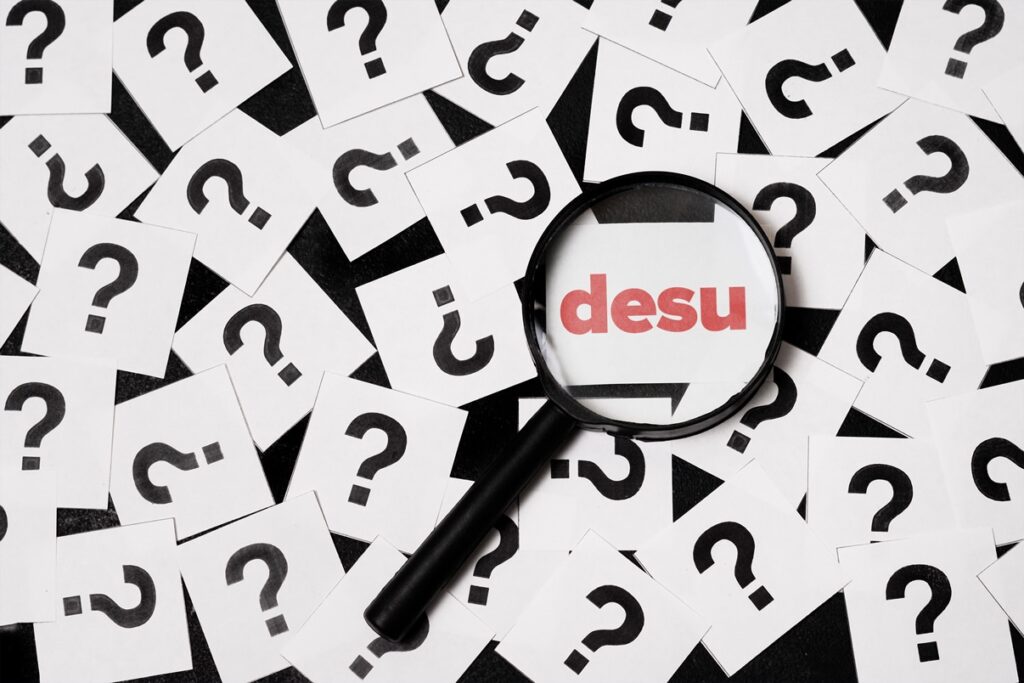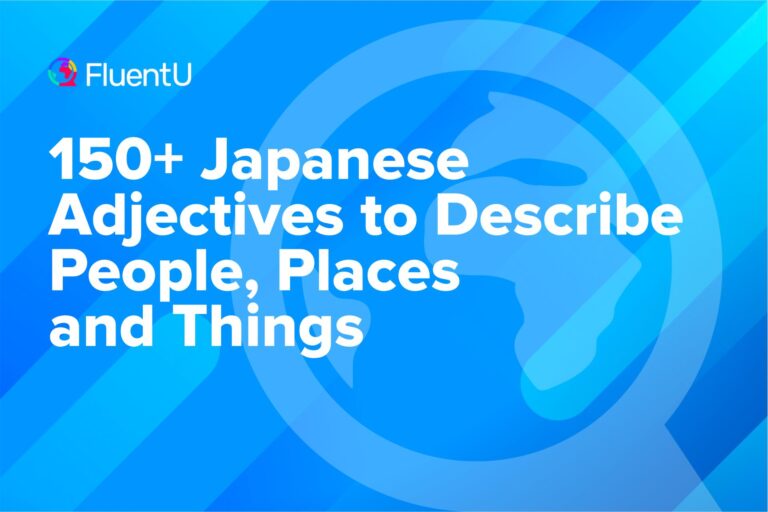What Desu Means, How to Use It and Audio Examples

です (desu) is often translated as “to be” in English. However, です is so much more complex and nuanced than that.
Read on for a full explanation of the politeness and grammar aspects of the Japanese です.
Download: This blog post is available as a convenient and portable PDF that you can take anywhere. Click here to get a copy. (Download)
The 4 Forms of です You Need to Know
Simply put, です means “to be” and comes at the end of sentences, as all Japanese sentences follow a subject-object-verb pattern. It’s pronounced as dess rather than de–soo.
Here are the four most common forms of です.
です (desu): The polite and most common form
In most cases, it’s best to use the polite form of です—which is, well, itself.
Not only does it ensure that your sentences are grammatically correct, but also that they’re not offensive. It’s standard to use です with your superiors or people you might not know very well.
でございます (degozaimasu): The respectful form used in formal situations
If you’re familiar with 敬語 (けいご)— keigo or polite speech, you know that verbs can have very different levels of politeness.
でございます is considered a very respectful form of です and has the same meaning and usage.
You might find it written in email correspondence or on website pages. You may also hear it spoken in meetings and presentations.
である (de aru): The polite form used in public speech and literature
You’ll likely see である as the form of です most often used in journalism and formal writing, so it’s good to know for reading the news in Japanese.
だ (da): The casual form used in informal situations
Lastly, だ indicates the lowest level of politeness. Thus, it can sound very straightforward.
Take the following examples and their translations:
何方様ですか? (どなたさまですか?)— May I ask who might you be?
誰ですか? (だれですか?)— Who is it?
誰だ? (だれだ?)— Who dat?
How to Use です
As a linking verb or copula
です is used to connect subjects and predicates. For example:
私の名前はトムです。
(わたしのなまえはとむです。)
My name is Tom.
今日は金曜日です。
(きょうはきんようびです。)
Today is Friday.
As a connector for two independent sentences
Whereas と (and) is used for connecting nouns, です is used for connecting two complete sentences.
Like the Japanese godan verbs, です has a -てform (connecting form), which is で , as in:
試験は今日で、結果発表は来週です。
(しけんはきょうで、けっかはっぴょうはらいしゅうです。)
The test is today and the presentations are next week.
With adjectives and verbs
Using です with adjectives and verbs doesn’t change the meaning or tense of these words.
東京は人口が多いです。
(とうきょうはじんこうがおおいです。)
Tokyo is highly populated.
In casual speech, です is usually omitted. Here’s the same sentence with and without です:
昨日は寒かったです。
(きのうはさむかったです。)
It was cold yesterday.
昨日は寒かった。
(きのうはさむかった。)
It was cold yesterday.
Remember, because Japanese adjectives can be conjugated, です doesn’t function like the “to be” verb in English. So でした (the past tense of です) would sound unnatural if used as follows:
昨日は寒かったでした。
(きのうはさむかったでした。)
It was cold yesterday.
To soften strong expressions
Another unique aspect of Japanese adjectives and verbs is that they can take on the 〜たい or the “I want to…” form. For example:
いちご食べたい!
(いちごたべたい!)
I want to eat strawberries!
Expressing desire like this sounds very powerful. So you’ll typically want to soften the impact with です or even 〜と思います (〜とおもいます). 〜と思います literally translates as “I think that…” but acts as a humble sentence ending to display politeness.
コーヒーを飲みたいです。
(こーひーをのみたいです。)
I want to drink some coffee.
コーヒーを飲みたいと思います。
(こーひーをのみたいとおもいます。)
I would like to drink some coffee.
As 〜のです (~no desu)
The の particle goes at the end of a sentence to explain something to the speaker. Here, です is optional and its form depends on the style of speech, but its presence (or absence) doesn’t change the meaning.
コーヒーを飲みたいのです。
(こーひーをのみたいのです。)
I want to drink some coffee.
How to Conjugate です
です can be used in different tenses.
The past tense of です is でした , with the casual form being だった .
昨日は私の誕生日でした。
(きのうはわたしのたんじょうびでした。)
Yesterday was my birthday.
You can link different statements together, but they don’t have to be in the same tense:
昨日は私の誕生日でしたが、今日は妹の誕生日です。
(きのうはわたしのたんじょうびでしたが、きょうはいもうとのたんじょうびです。)
Yesterday was my birthday but today is my little sister’s birthday.
There’s also the presumptive form, which (as the name suggests) is used for uncertainty and presumptions. The polite form is でしょう , while the informal form is だろう .
今年の勝者はあのひとでしょう?
(ことしのしょうしゃはあのひとでしょう?)
Isn’t she the winner this year?
これでよろしいでしょうか?
Is this fine?
Remember to keep an eye out for all uses of desu, both in written and spoken forms. FluentU is one program that can help you see how it pops up naturally in conversation.
FluentU takes authentic videos—like music videos, movie trailers, news and inspiring talks—and turns them into personalized language learning lessons.
You can try FluentU for free for 2 weeks. Check out the website or download the iOS app or Android app.
P.S. Click here to take advantage of our current sale! (Expires at the end of this month.)

Now, you have all the tools and knowledge you need to get out there and score some perfectly structured sentences.
And One More Thing...
If you love learning Japanese with authentic materials, then I should also tell you more about FluentU.
FluentU naturally and gradually eases you into learning Japanese language and culture. You'll learn real Japanese as it's spoken in real life.
FluentU has a broad range of contemporary videos as you'll see below:

FluentU makes these native Japanese videos approachable through interactive transcripts. Tap on any word to look it up instantly.

All definitions have multiple examples, and they're written for Japanese learners like you. Tap to add words you'd like to review to a vocab list.

And FluentU has a learn mode which turns every video into a language learning lesson. You can always swipe left or right to see more examples.

The best part? FluentU keeps track of your vocabulary, and gives you extra practice with difficult words. It'll even remind you when it’s time to review what you’ve learned. You'll have a 100% personalized experience.
Start using the FluentU website on your computer or tablet or, better yet, download the FluentU app from the iTunes or Google Play store. Click here to take advantage of our current sale! (Expires at the end of this month.)







